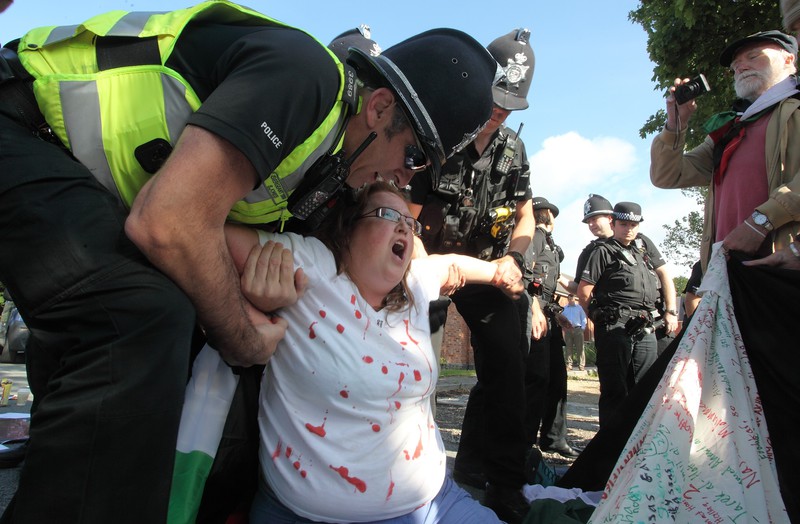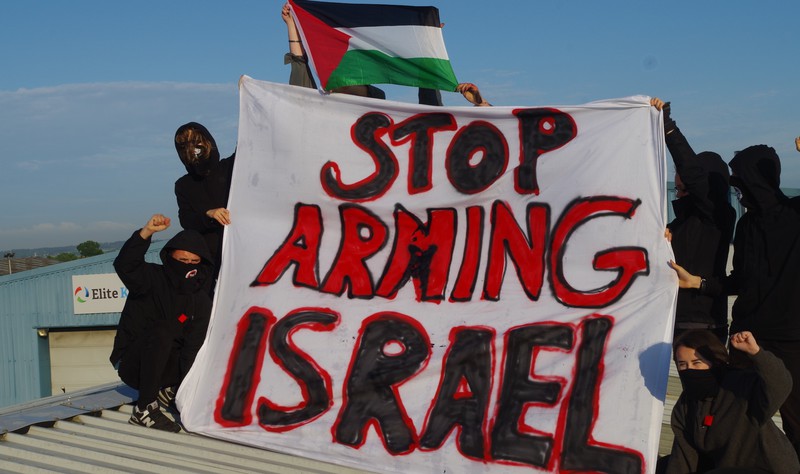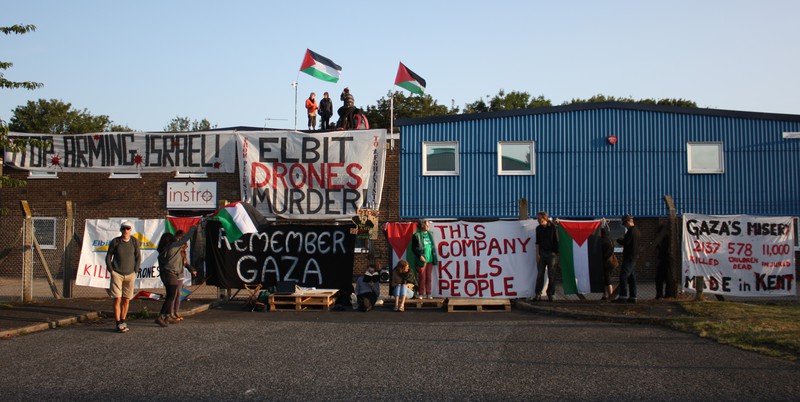Protests close four factories owned by Israeli
arms firm Elbit
Activism
and BDS Beat 6
July 2015

UK activists today shut down three of four Elbit-owned factories, including a drone engines plant.
Protesters today shut down four different factories owned by Israel’s biggest arms company, Elbit Systems. The protests mark the one-year anniversary of the 2014 Israeli attack on Gaza.
Police issued an injunction against protests at one of three UK sites, a drone engine factory near Shenstone, Staffordshire. Despite this, a number of activists have been locked-on at UAV Engines Limited (UEL) since early this morning, blocking the road and entrance to the factory. Hundreds of Palestine solidarity campaigners are supporting them. Police have made at least 10 arrests.
Also in the UK, production has been halted at Elbit’s Elite KL factory in Tamworth, Staffordshire. A third Elbit-owned factory called Instro Precision in Broadstairs, Kent, has also been shut down. Activists are protesting on the roof of both factories.
A similar occupation took place in Melbourne, Australia.
The activists accuse the company of complicity in Israel’s alleged war crimes in Gaza.
Amnesty International research into the UEL factory has indicated that components made in the factory, engines for armed unmanned aerial vehicles (UAVs, or drones), were used in Israel’s 2008-2009 attack on Gaza. Code-named “Operation Cast Lead,” this attack killed 1,400 Palestinians in Gaza.
The UEL factory is known to export its drone engines to Israel.
The Shenstone and Broadstairs factories have been targeted by protesters before. At the height of Israel’s 51-day assault last year, nine protesters staged a sit-in on the roof of the UEL factory, closing it for two days in August before they were arrested. Rooftop protesters shut down the Instro Precision factory in Kent for a day in February, with no arrests made.

Photo given out by activists shows protest on the roof of Elite KL, an Elbit-owned factory in Staffordshire, UK.
According to a police statement by the Shenstone factory’s general manager, seen by The Electronic Intifada in February, the protesters’ action cost the company £186,000 (almost $280,000) in lost revenue.
Yet charges of “aggravated trespass” were later dropped by the Crown Prosecution Service just hours before a deadline set by the court for the prosecution to release critical documents. The evidence to be disclosed related to arms export licences granted to UEL to send its hi-tech engines to Israel for use in the Hermes 450 drone.
The dropping of the case left Elbit factories in the UK open to direct action such as is taking place today. Adie Mormech, one of the Shenstone nine, said in February that it was a “green light for further action” by activists against the factory.
Solidarity with Palestinians
Elly Hassan, from London Palestine Action, one of the groups coordinating today’s “Block the Factory” actions, said: “These Israeli-owned factories are very much a part of Israel’s brutal regime of apartheid and settler-colonialism over the Palestinian people.”

A photo given out by activists shows Elbit-owned targeting and optics plant Instro Precision in Broadstairs, Kent is once against shut down today.
“Israel was only able to massacre thousands in Gaza last summer because factories like these are allowed to operate and because governments such as the UK government continue to allow arms exports to Israel,” she explained.
“People have come here from all over the country to show their solidarity with the Palestinian struggle for freedom, justice and equality and to demand that the UK government imposes a two-way military embargo on Israel,” she continued. ”We urge people that share our opposition to Israel’s crimes against the Palestinian people to join the growing movement for a boycott of Israel.”
Last summer in Gaza Israel killed more than 2,200 Palestinians including 551 children. The 2014 assault, which Israel code named “Operation Protective Edge,” also left approximately 11,000 people injured, including 1,000 children left with permanent disabilities. An estimated 18,000 homes were destroyed or severely damaged, making 100,000 people homeless.
“Business as usual”
During the bombing, arms sales to Israel became a topic of intense political scrutiny in the UK. Conservative government minister Sayeeda Warsi quit her post in the cabinet, calling the UK government’s stance “morally indefensible.”
A report called “Arming Apartheid,” released last week by the Campaign Against the Arms Trade, War on Wantand the Palestine Solidarity Campaign, found that fresh arms exports to Israel worth nearly £4 million ($6.2 million) - including components for drones - were approved by Britain within weeks of the attack.
These deals show that despite Israel’s alleged war crimes, the government’s attitude to the arms trade with Israel is “business as usual,” they said.
The action also marks ten years since the launch of the boycott, divestment and sanctions movement that pressures Israel to comply with international law. In the UK, the movement is backed by major UK trade unions, the Green Party and the National Union of Students.
Recent successes include the announcement by Orange that it intends to leave the Israeli market and the news that foreign direct investment into Israel has dropped by almost 50 percent last year, partly due to the growth of the boycott movement.
For updates throughout the day, follow @blockthefactory, @LondonPalestine and #StopArmingIsrael on Twitter.